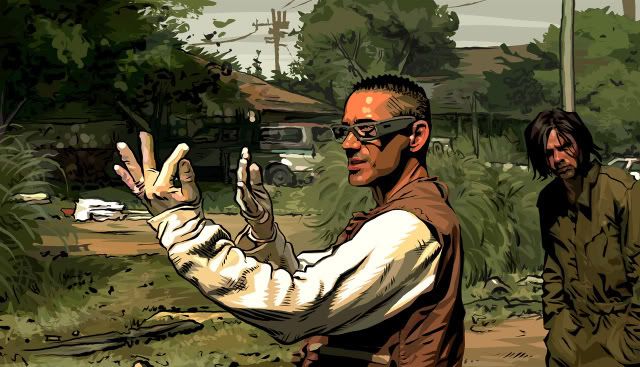The Visitor

The Visitor, Tom McCarthy. [B] december 30 2008.
Usually after I watch a movie I like to read about it a bit. While doing that after seeing The Visitor, I happened upon a review of it written by Scott Foundas that I found to be off-base and I started writing a comment on the article before realizing that a) I was writing a blog post and b) there's not much point in commenting on months old articles. I'm just writing this because otherwise my original first sentence wouldn't make much sense in the context of a standard blog post:
I think you're projecting a bit here. This isn't a movie about how liberal white America's a bunch of dunces because of their obliviousness to other world cultures, it's about an uptight guy dealing with the death of his concert pianist wife and his obliviousness to other world cultures, which, granted as a college professor dealing in globalization is maybe a little bit much, but the premise of the film wouldn't really be served by him knowing about this stuff, and I think seeing that he doesn't further drives home the point of how aimlessly he's made his way through life thus far, presumably even when his wife was around. The scope widens when dealing with the issue of immigration law, but that doesn't mean that it casts its net so wide as to implicate every single person in this country for having a hand in it. You know how Tarek, Mouna and Zainab don't blame Walter for this happening to them? The movie doesn't blame you, either, it's just saying it's kind of a drag that this kind of thing is happening, is all. The Visitor's pretty understated overall, even with its occasional lapses into distastefulness (Richard Kind's completely unnecessary and kind of hateful character, that tacky fade to white on the American flag in the airport) and I think some critics have been mistaking its understatedness for lazy all-inclusiveness. I'm a guy that suffers from liberal white guilt from time to time, but it's pretty bonkers that folks are allowing themselves to get so neurotic they start feeling liberal white guilt over their liberal white guilt.
At the heart of this movie is a simple, humanistically told story anchored down by four really strong performances. The fact is that, given the premise of this movie - uptight white guy comes home to an apartment he never uses only to find an Arab man and an African woman misled into renting the place and who unlock a once-repressed joie de vivre in him through the magic of the djembe before one of them is unjustly placed in an immigration detention center - I was expecting it to be more or less unbearable. Things proceed the way you'd expect them to given the premise but what's surprising about the film is that it retains a sense of believability because of the deftness with which this material is handled. Tarek, while definitely a loveable kind of guy, isn't just a magical pixie that comes out of nowhere to unlock the rhythm in this white guy's heart with his pure-hearted otherness, he's a dude who's probably being self-consciously nice to a man who let him stay in his apartment despite the aforementioned misunderstanding, an act which in turn probably wouldn't have ever happened were it not already established that Walter is at the lowest point in his life he's had in years. Sure there are manipulations, it's a film and thus a heightened reality, but the story flows in a believable way and there are no fake dramatic moments where a character unconvincingly decides not to listen to another or does something stupid solely, and obviously, for the sake of advancing the plot in a certain direction. It's smarter than most, even if it's still kinda naive at times, and really an impressive juggling act that manages to only drop the ball a couple times.
Labels: the visitor, tom mccarthy




